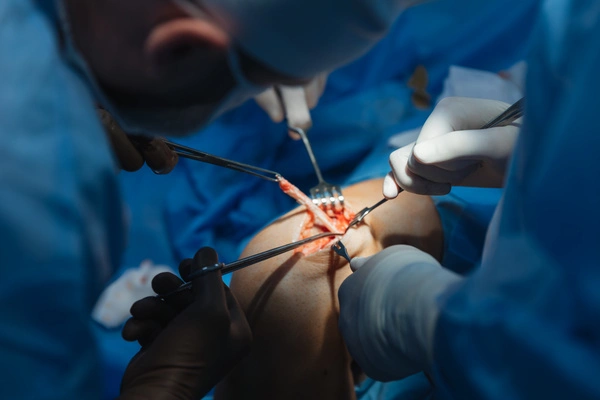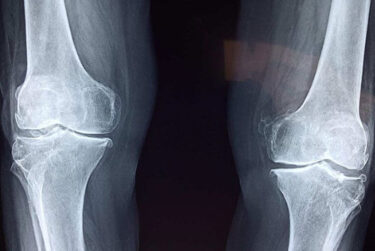Estimated reading time: 4 minutes
Finding out you need knee replacement surgery can feel overwhelming. To manage that feeling, it’s natural to want to gather as much detail about the procedure as you can. One of the first questions that might pop into your mind is, “How long does the knee replacement surgery take?” It’s a great question and one that many people ask as they start to prepare for the procedure.
Understanding the timeline can help ease any concerns and give you a clearer picture of what to expect. So, let’s dive into the details!

Private knee replacement surgery at a glance
- Waiting time: 4-6 weeks
- Cost: £13,149
- Ways to pay: self-pay or insured
- Hospital stay: same-day or in-patient
- Procedure time: 1-3 hours
How long does a knee replacement take?
Most knee surgeries take between 1-3 hours but the exact surgery time depends on:
- the type of knee replacement you are having
- the complexity of your case
- the surgeon.
How many hours is a full knee replacement surgery?
A total knee replacement, in which the entire knee joint is replaced, takes between 2-3 hours.
How long does a partial knee replacement operation take?
Partial knee joint replacement normally takes between 45 minutes and an hour.
How long does anterior cruciate ligament (ACL) surgery take?
ACL knee reconstruction surgery lasts between 1 and 1.5 hours. You may need to stay in hospital for a night but in some cases it can be carried out as a day case.
How long does knee revision surgery take?
Most revision total knee replacements take longer to perform than primary procedures – roughly 2-3 hours.
How long does knee arthroscopy (keyhole knee surgery) take?
Arthroscopic knee surgery is a minor surgical procedure and typically takes between 30 and 45 minutes to complete.
Knee replacement surgery – at a glance
Knee replacement waiting times
Before you even get to the hospital, one thing you’ll need to consider is knee surgery waiting times.
According to a report from the Royal College of Surgeons in England1, the number of patients on the NHS waiting list reached six million in 2022. Of these, over 18,500 had been waiting for more than two years for their surgery. Patients facing the longest waiting times are for Trauma and Orthopaedic treatment, such as hip and knee replacements.
The NHS has a Waiting List Tracker that allows you to check current waiting list times in your area. It also allows you to filter by treatment, average waiting times, highest waiting times, and much more.
If you want to speed up your knee replacement, the average waiting time for private patients is between 4-6 weeks.
Pre-surgery prep time: 1-2 hours
While the surgery itself might only take a couple of hours, you should factor in some extra time for preparation. Before the surgery begins, you’ll go through a pre-operative process. This includes:
- getting changed into a gown
- having an IV line inserted
- meeting your anaesthesiologist.
This pre-surgery prep usually takes about 1-2 hours.
Knee replacement operation time: 1-3 hours
As mentioned above, most knee surgery procedures take between 1-3 hours.

Recovery room time: 1-2 hours
After the surgery, you’ll be taken to the recovery room where the medical team will keep an eye on you as the anaesthesia wears off. This phase usually lasts about 1 to 2 hours. During this time, your vital signs will be checked regularly and you’ll gradually start to wake up and become more alert.
What happens after surgery?
Once you’ve spent some time in the recovery room, you’ll either be moved to a hospital room for an overnight stay or discharged the same day, depending on your situation and the type of surgery.
At Practice Plus Group, we follow the Enhanced Recovery Pathway (ERP). This is a modern, evidence-based approach that helps people speed up their recovery following major surgery and reduces the chance of blood clots. The ERP champions the many advantages of day surgery knee replacement. With this support you will be mobile enough to go home either on the day of surgery, or soon after.
Pain medication in the form of anti-inflammatory drugs are administered upon discharge from hospital. This is to help with pain relief and to manage pain and swelling.
Knee replacement recovery times: 6-12 weeks
Recovery time depends on the type of knee surgery you’ve had, your general health, and how old you are.
If you’ve had surgery on a torn meniscus, for example, the knee operation recovery time is usually between 2-3 weeks. A partial knee replacement will usually take between 3-6 weeks to recover from. A total knee replacement will take around 6-12 weeks.
An advantage of knee arthroscopy is the minimal invasive day surgery. This means there’s a shorter recovery time and reduced risk of complications. The recovery time is typically around 6 weeks.
It may take up to 12 months to fully recover from knee revision surgery. Most people will feel comfortable going back to work and resuming some of their everyday tasks and activities 3-6 months after the surgery.
It usually takes about 6-12 months to make a full recovery from ACL reconstruction alongside physiotherapy.
Knee replacement surgery recovery – time off work
The time you’ll need to take off work will depend on the type of job you have. For instance, if you work in an office, it’s likely you’ll be able to return after a week or two. However, if your work requires a commute, you’ll still need to factor this in.
Air travel should be avoided for around a week after surgery. Don’t hesitate to ask your doctor or surgeon for more information about returning to work.
Pain in your knee?
If you’re experiencing knee pain, try our knee suitability quiz. It will give you an idea of whether you’d benefit from booking a consultation with one of our knee specialists.
Sources and references
1 https://www.rcseng.ac.uk/news-and-events/media-centre/press-releases/nhs-waiting-list-hits-record-high/
2 https://www.ncbi.nlm.nih.gov/pmc/articles/PMC1127183/
Wellsoon private healthcare
Wellsoon is a service from Practice Plus Group that provides a range of treatments for patients paying for themselves or paying by private medical insurance. With no hidden costs, you’ll pay less than you might think and be back to your best sooner than you thought.
- £95 consultation within 1 to 2 weeks* – includes x-ray, bloods and swabs
- Surgery in just 4 to 6 weeks*
- Experts in hips, knees, eyes, hernias and more
- Pay for yourself or via health insurance
- 0% finance options available


Acknowledgements
How long does a knee replacement operation take? FAQs
Not yet found the information you’re looking for? Perhaps our dedicated FAQs can help!
You won’t be able to drive again until you can bend your knee enough to get in and out of the car while controlling it properly. Achieving this range of motion will typically be around 6-8 weeks after your surgery. Ask your surgeon or doctor for more information.
The answer to this question takes into account various different perspectives. For example, with regards to the weather, the best time of year for knee replacement surgery is either Spring or Autumn. This is because in the Summer, you’re more likely to have the heat to contend with, which could make keeping cool an issue. Likewise, surgery in the Winter means any recovery exercises outdoors could be undertaken in snowy or icy conditions.
Other factors to consider are:
– when you’re likely to get the time off work (if you work)
– whether your friends and family can also have time off to support your recovery
– when your orthopaedic surgeon can accommodate you.
Although available to most age groups, knee replacement surgery doesn’t tend to be recommended to younger patients below the age of 50. This however, depends on the severity of the damage, the amount of knee pain the patient is experiencing, and their overall quality of life. The typical age of a hip or knee replacement patient is between 50-80.
The short answer is: yes. Total knee replacement surgery for both knees (sometimes called a bilateral procedure) can be performed. However, this treatment option comes with factors to consider. For instance, to qualify for the surgery, you’ll need to be healthy and at the younger end of the typical age range for knee surgery.
You will also need to think about the recovery process. With both knees operated on, the initial recovery period will become much more of a challenge. A bilateral procedure leaves you without a ‘good’ leg to support you. On the other hand, single knee replacement patients would typically be walking with minimal aid within a few days.
On the other hand, having both knees operated on at the same time means you would only have one recovery period to negotiate. This option is better for patients who might struggle to take a lot of time off work.
In the majority of patients (between 85% and 90%), a knee replacement will last about 15 to 20 years.2 Patients that had the procedure at a younger age may require a second operation to clean the bone surfaces and reset the implant.
There are certain activities you’ll need to avoid after a knee replacement. These are activities that carry a high risk of falling. Sports such as rugby, football and skiing should be avoided as these could cause damage to the new implant. Activities involving a lot of running and jumping should also be avoided, as well as sitting for prolonged periods of time.
Swimming, golf, walking and cycling after a knee replacement are all excellent options to explore to keep fit.
Longevity is one of the most important factors to consider if you need a knee replacement. The implant itself can be made from a range of different materials, which in turn can be combined to great effect. Each implant material has pros and cons, and some are more likely to last longer than others. The majority of knee replacements last between 10-15 years, with occasional cases lasting for much longer.







